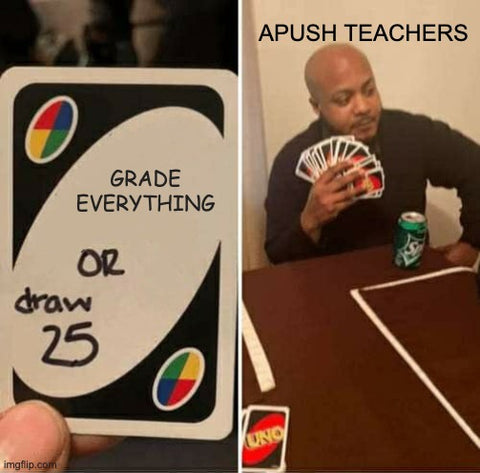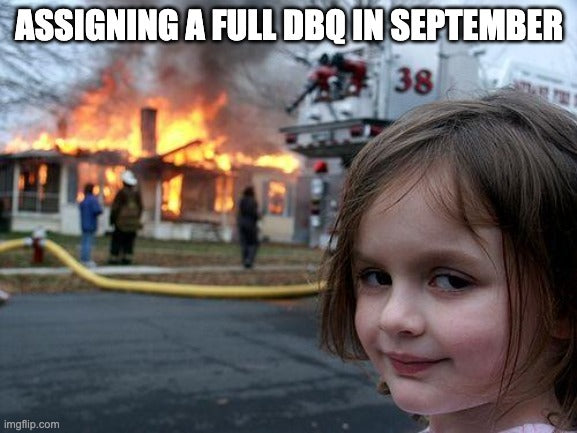Seven Tips for Teaching AP US HISTORY
The Essentials for How to Teach AP US History

AP US History can be one of the most daunting classes in high school for both students and teachers. It is a massive undertaking each and every year. But it is worth it. Even though, like many AP teachers, I have an array of issues and bones to pick with the College Board, it offers students a powerful survey of our country’s history and the opportunity to think deeply about the events that shaped our nation. Maybe more than that, APUSH offers students a serious challenge that will sharpen their reading, writing, and thinking skills throughout the year.
AP US History students who work to meet the demands of the course will be more ready for the rigors of college and life- and that makes it worth it.
But even veteran teachers struggle with how to teach AP US History and for first year teachers, it can be overwhelming and exhausting- but it need not be! After teaching APUSH for ten years in a title-1 school to mostly sophomores, I am sure these tips for teaching AP US History can help first year APUSH teachers as well as experienced ones be more successful and find more joy teaching it.
1. Stick to the Pacing Guide
This was the absolute best advice I got at my first AP Summer Institute before my first year teaching AP US History. It's challenging work to pace out the curriculum and skill development for an eight-month course. It is a disservice to teach World War II in one week, but it might be what you have to do to get through the curriculum.
And though you must race through many topics, you also should choose some topics to dive deeper into. Have an amazing Civil War project or just absolutely love hosting a simulation on the Constitutional Convention? Great! Build in a few more days for that, but know you will have to cut out time elsewhere. Life and APUSH are about compromises. Right, Henry Clay? But once you have your pacing guide, stick to it. If you gave an extra class period for every lesson you didn’t get to finish, you will never get past World War II.
This is simple advice to give but hard to follow. So stick to your schedule even when it hurts. Allow one or two weeks to review before the exam, plan an all day Saturday session if you must, and they’ll be ready on game day. These review materials will really help!
2. Grader Beware.
If you tried to grade everything your students completed for APUSH, you would never have time to teach, sleep, or have any fun. You absolutely need a method and system for what you will grade and what will just be credited and checked off. In the nine years I have taught APUSH I have never graded a simple in-class worksheet, notes, or really, about 90% of class work. I grade homework, tests, DBQs, LEQs, and SAQs, and oral presentations and discussions live, on the spot. Students earn 100% on all classwork so long as they are putting in their best efforts- and knowing this, they nearly always do. This allows me to spend time giving feedback where it counts- on skill development.
Classwork is practice. It shouldn’t be penalized. So let them make mistakes along the way. For their sake and yours.

3. Break the Tension & Allow For Fun
If AP students are the highest performing ones on campus, they are also often the most stressed and anxious ones as well. They probably have multiple AP classes, volunteer on the weekends, lead clubs on campus, and far too often have overbearing parents hovering over their shoulders. You need to find ways to break the tension, have fun, and laugh with your students.
AP cannot mean Always Pushing.
Allow opportunities to be silly, dorky, and when necessary, relaxing. My favorite little thing to break tension is my, “Dad Jokes in History!” I try to have one horrible dad joke per day. “Do you know what nationality the settlers at Jamestown were?” ... "Colon-ese." They will roll their eyes, but they'll like it. Even better, after a particularly challenging lesson, challenge students to a “Dad Joke Throwdown!”
After ‘heavy’ classes with lots of writing or heavy reading, plan a fun, low-stress activity like creating memes, APUSH Pictionary, or when in doubt- kahoot! And make time for small talk and connection- these students need it and so do you.

4. Don’t Lose the Story
There is a reason why all cultures begin with creation stories not creation lectures. They wouldn’t survive otherwise- and your students won’t either. If your lectures are always just hammering home the facts and leaving out the story, they will lose the bigger picture and over the long term, be miserable. It might save time in the short term but you’ll lose them in the long term. APUSH is a marathon, not a sprint. Don’t cramp up and tap-out at mile 16.
History is fundamentally a story (it’s in the name for gosh sake!) and the story is what keeps it interesting and memorable! While it's true that there are a daunting number of historical concepts, essential terms, and dates they must learn with only limited time, if all your lectures do is drill and kill, you will be left with a lot of casualties.
5. Chunk the DBQ: One Skill At a Time
How to teach the DBQ is the most challenging part of the course for most teachers. There is simply no way students can learn it all at once. It's much more manageable if you break it into parts and teach it one step at a time.
To teach the DBQ successfully start with simple document analysis- SOAPStone or HIPP is how most teachers introduce students to analyzing documents and it works! Grab my free SCOAPS sheet here (it adds one little twist that I think really helps students think more deeply about the content).
Then have students learn how to apply that document to a simple prompt. Many prompts for APUSH essays are complex and confusing, but when you are teaching something new keep it simple. Never try to teach new skills alongside new content. Thats like asking students to learn how to juggle using flaming machetes.
At first, you might even make the prompts silly (this breaks tension too!): “Were the Founding Fathers a bunch of Karens?” Have them apply Patrick Henry’s “Give Me Liberty or Give Me Death” speech to that prompt and watch magic unfold. (One of my students created that prompt and it was a hit! They referenced it all year.🤣)
Then teach them how to HIPP the documents within the essay. Then move to how to argue with the documents to support the thesis. It’s one step at a time or they will fumble all year and faceplant on the AP exam.
Give them sentence starters or frames to help. I have simple and quick worksheets that build these skills one step at a time. You can check them out here. For me, students don't write their first full DBQ until February and by March they do their first timed one. If you build their skills step by step, they may not even hate writing them and it makes grading them less miserable.

6. Keep it Simple
APUSH is complicated and challenging enough, you don’t need to go out of your way to increase the rigor and demands of the course only for the sake of it. I wish I got this advice before my first (or even my fourth) year teaching the class because it's so important. My first years teaching AP US History, I wanted to really make sure I was challenging students and getting them ready for college. While this is definitely important and one of the goals of the course, you don't have to go above and beyond to accomplish this. Simply getting through the course, building up the skills they need, and holding them accountable for their learning will do this.
To teach AP US History successfully you don't need a secondary textbook (I can’t believe some teachers still do this), or an exhaustive set of projects and research papers. Your students should be reading the textbook and either taking notes, answering questions, preparing for quick quizzes, or doing what my students do- writing a critical analysis of the chapter’s main ideas to prepare for discussion circles.
On top of that they will be writing plenty of essays, analyzing primary sources, and studying for demanding unit exams. Perhaps if you teach at a high performing private school, this advice should be ignored, but for most of us, simply preparing students for the exam and doing justice to the history is rigorous enough.
7. On Day One, Ask Students Why They are in APUSH
All APUSH teachers experience students who drop off during the year. Some start giving up because they are overwhelmed, because they are not used to struggling, because they have found other interests, or because they have the impulses of a teenager. Go figure 🤷♂️.
That is why on day one of class, I hand out bright index cards and ask them to write out why they signed up for APUSH. I don’t tell them anything else except it should be 4 sentences. Nearly always students write about wanting a challenge, to prepare for college, to grow their skills, or to get college credit.
When a student starts struggling months down the road and if it looks like they are giving up, I hand them the card and ask them if any of that has changed.
This is the most powerful strategy I found that rekindles some spark of a waning fire inside them. It doesn't always work- but it often does. Or if parents are demanding to know why their child has X grade, you can read them the card, showing how their child chose this class because they wanted a challenge and embraced the difficulty.
Worse yet, some teachers struggle with whole classes giving up or protesting about the work being too challenging or too much. If this happens, hand them all their index cards back and have them reflect on this together.
Empathisize with them, but remind them you are only doing your best to give students the best education possible and teaching AP US History in a manner fitting what the students themselves expected when they signed up. This is an ace up your sleeve when you need it.
Best of luck this year in APUSH!
-dan lewer
PS - I rely on these skill-building workbooks so much throughout the year. They are 16 pages of tasks and activities that help students master the content and the workbooks actually teach the skills as students complete the tasks. Super helpful!
PSS- Need extra with the writing skills? Grab my DBQ & LEQ Bootcamps!




I loved your explanation of chunking the DBQ for students to allow them to develop the skill. How would you have a student work on a skill if you feel as though the rest of the class is ready to progress? Would you give them separate assignments or just encourage them to work on both in the next DBQ?
Leave a comment